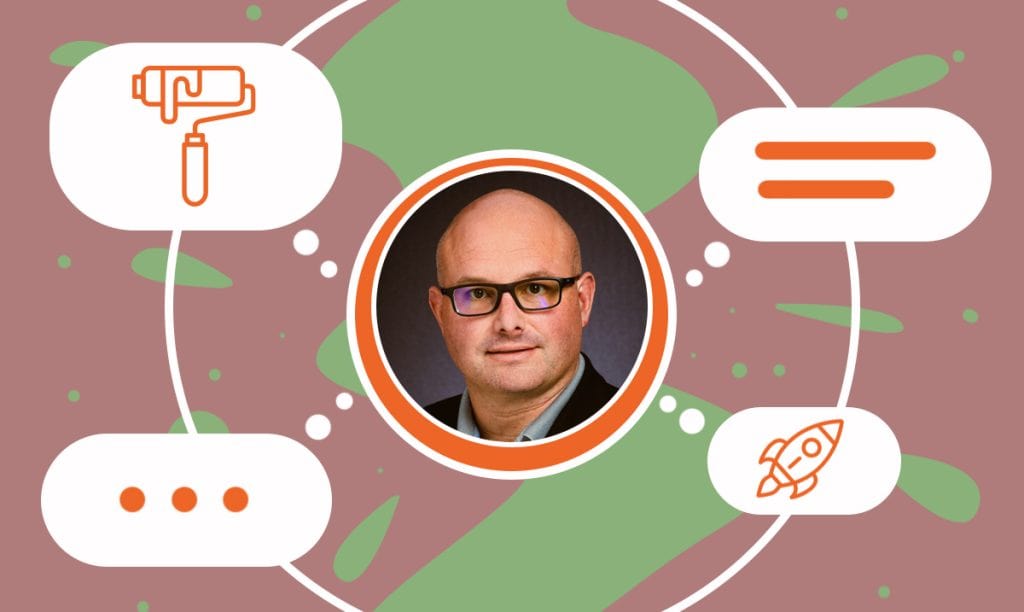Gerry Mateo, a retired veteran, found an unexpected opportunity during the pandemic with the creation of FilAm Vets Hydroponics Farm. As the firsthy ...
How Chris Heerdegen Built a Multi-City Painting Business
Written by: Carolyn Young
Carolyn Young is a business writer who focuses on entrepreneurial concepts and the business formation. She has over 25 years of experience in business roles, and has authored several entrepreneurship textbooks.
Published on October 4, 2024

When Chris Heerdegen founded OnDemand Painters, he wasn’t just looking to launch another painting company; he wanted to transform the industry. Recognizing the need for faster, more reliable, and consistently high-quality service, Chris set out to fill a gap in a market often plagued by delays and subpar work. In this interview, he shares the journey behind his business, how he ensures top-notch service across multiple locations, and the strategies that have fueled his company’s growth.
The Birth of OnDemand Painters
SBS – What inspired you to start OnDemand Painters, and how did you identify the market gap?
Chris – I’ve been in the industry since I was 19. I worked in a company and was kind of second to the owners. However, there’s a cap on how to scale a painting business. The reason why most painting businesses, on average, have about one and a half employees is because their prices get too high as they get overhead.
One of the game-breaking things that I figured out was how to estimate a project remotely — interior or exterior. A regular full-time salesperson can usually do about 12 estimates weekly in person, but I can do about 250 by myself on the computer. I developed the algorithms and the software to do it, which multiplied my business 20 or 30 times. It’s incredibly low overhead, which also allows me to stay competitive price-wise.
Standing Out
SBS – What makes you competitive in such a competitive market?
Chris – The trade’s usually pretty rough for a few reasons. Sometimes, people grow up learning how to paint well, but they don’t learn much about customer service or business or don’t like that side of the business. Or they spend eight hours working on a job site, and the last thing they want to do is return a phone call.
I’m never on a job site. I work with great painting businesses, and I 1099 them. They’re responsible on the job site, which means I’m responding to emails, calls, and texts almost within minutes of receiving them. I do all the sales, marketing, and contact with the client, which takes it out of the painter’s hands. My service is hard to beat because I’m available and energized for all that stuff.
The other aspect is keeping quality high as you scale. That’s kind of a recruiting thing. You can find a great crew, but that doesn’t mean they’ll always be great. That’s why I’m always looking for my next best crew. I always have somebody on deck for those cases, and should something go wrong, I don’t hesitate to replace them. These are people, and things will go wrong. That doesn’t mean I’m firing a crew if they make one mistake. However, I’m always in a recruiting mindset, and I never feel stuck with the people I have.
Also, I white-label a number of applications and connect them, from CRM to invoicing software. The objective is to minimize the impact on the process. I look at how many clicks it takes me to produce an estimate, and I think about how I can reduce the number of clicks and make things faster.
Whenever someone starts a business, I think they make the mistake of not thinking about scaling to where they make more money and can leave their business instead of working in it all the time. Many business owners get stuck working in their business and making ends meet, but they can’t grow it because they didn’t consider the growth before getting into it.
Sometimes, people don’t delegate tasks to others because they’ve tried that and people have let them down, or they are afraid to because they don’t think their people are good enough. Again, I think it’s a recruiting issue more than a willingness to delegate. I think they’re comfortable with who’s there and don’t want things to break. But as an owner, you need always to be recruiting. You need to always be considering the next best person. It’s not because I want to kick out somebody, but my obligation as an owner is to have a seamless change if somebody cannot do something else.
Consistency Across Locations
SBS – Since you work with a lot of painters, what strategies do you use to ensure the same quality across different locations?
Chris – I have several things I look at. First of all, they have to have proper insurance. If they don’t carry workers’ compensation and liability insurance, I don’t even consider them. When you have workers’ compensation as a painting company, you have to have been big enough to have employees to afford it, which means you have more jobs and experience under your belt.
From there, I ask a lot of open-ended questions, like “What have you learned about making a client happy in your work as a painter?” I try not to suggest things. I want to hear what they say. For example, if you’ve been in this business a while, you know that showing up even five minutes late on your first day is a really bad idea. Customers may seem fine with it, but they will start scrutinizing your work more. Show up early; that would be the best.
I also check if they clean up the job site every day. We can get a great paint job done every single time, but the issue will be if the client doesn’t have the proper expectations during the process. They don’t know how this stuff goes. For example, we could not be done with a room, but the client thinks we are, and they get upset overnight because they think it looks terrible. Then we have to tell them it’s not done. A lot of communication is involved in helping clients perceive it to be a good job. It doesn’t matter what we think is a good paint job. It matters what the client thinks.
Effective Marketing
SBS – What kind of marketing tactics have proven to be the most effective when it comes to your business?
Chris – I’ve tried just about everything, from purchasing leads to passive advertising, flyers, mailers, etc. Number one — I’m fairly adept at local search engine optimization, specifically a Google My Business (GMB) listing. Knowing what Google is looking for to rank there is a big part of my business. If somebody types in Google “painters near me,” there’s a map listing, and three businesses will show up. If you can get in that top three, you’ll consistently get phone calls.
The other part is small business networking groups, getting in touch with really good roofers, carpenters, and plumbers. It’s good, first of all, for me to be able to refer people I trust if somebody I know needs that. Likewise, a plumber will cut holes but don’t fix them; they need somebody else to fix and paint them. Networking is a time commitment, but you’re not spending money on it. There’s an opportunity cost there, and the return on investment is astonishingly good — you need fewer referrals to book more work, and the clients tend to be better. With every other thing I’ve tried, the return on investment was marginal at best.
Marketing is industry-dependent. Google ads might work a lot better for a roofing than for a painting company because the job size and the transactions are bigger in the first case.
Customer Satisfaction
SBS – How do you manage warranty claims and ensure that customers are satisfied?
Chris – Well, I’ve dealt with warranty claims for decades, and I’ve learned a very important lesson about warranties: you do them right away, making them the highest priority (which you should anyway because you’re talking about a client who’s already paid you). As a customer myself, if I call for a warranty, I fear I won’t get something done properly. It happens all the time in different industries. I want people to have peace of mind that I’ll return their call right away and say we will get on it. I buffer that into my pricing; maybe 1% of all of my jobs is put into paying for warranty work. I plan it so I don’t have to worry about paying out of pocket.
Building a Skilled Team
SBS – Can you describe your approach to hiring and retaining skilled workers?
Chris – It is somewhat industry-dependent. What I find, in general, is that people don’t cast a wide enough net. They don’t want to spend much time doing interviews to figure out who is the best.
As you’re hiring and having attrition, you need to identify what things you thought would work actually don’t work. Yes, I’m interviewing people, but to some degree, they have to interview me and see if they want this job. I take that approach, and I have to set proper expectations. If you can meet or beat the expectations you set, you’re going to retain people. However, recruiters often feel like they need to oversell a job to get somebody to want it, and all that’s doing is creating more work on the backend. As an example, I don’t hire a nanny until I can find a good one. I only need one good one, but I hire two good ones because, inevitably, if one person is sick, I can’t afford not to have a backup. So, it’s volume, setting expectations, and meeting or exceeding those expectations. If you oversell an applicant, they get excited about the job, but if the income or the culture or the time commitment’s different, they’re not going to say anything; they’re just going to slowly quit in their head. When they tell you they’re quitting, they had already quit six months ago and were just looking for another job.
Project Management
SBS – What tools do you use to manage projects?
Chris – Unfortunately, there isn’t a tool that supports contracting businesses, though I’ve looked for it. There are a few things that I use in terms of software.
First is a CRM that acts as a good sales funnel. That’s very easy to find. What’s really hard to find is a CRM that helps you track and manage sales and the production of jobs well. They all think they do it, but they don’t. I use a CRM called ClickUp, which is similar to monday.com. Its user interface is really good for managing jobs, and it communicates well from sales to producing a job and orders. There’s also a lot of automation I can do with this app when it comes to follow-up and things like that.
Now, that CRM software doesn’t do estimating or invoicing, so I have to use a different application. For that, I use the Joist app. However, I don’t use it for payments, even though it’s possible, because I don’t like their payment system, and I want to offer dual pricing to clients (credit card price and check price). So, I have to copy-paste that to a different invoicing system.
Common Misconceptions
SBS – What is the most misunderstood aspect of running a painting business?
Chris – That’s a good question. Running a business, in general, I believe people tend to think that you’re just raking in gobs of cash all the time. The reality is that the cash flow is the scariest part of business. There are some weeks where it’s great and some weeks where it’s bad. Some people also underestimate how much of the job is done behind the scenes to ensure every client gets the same level of service. I think that is probably the biggest underestimation. It’s a lot of keeping track of things. It’s like being on a call like a doctor (but a lot less important because we’re not doing brain surgery). There are times during the day when I have nothing to do, but there are times when there’s dinner at night, and I have to take a call because a client needs something.
Entrepreneurial Guidance
SBS – What advice would you give someone who wants to start a similar business?
Chris – The number one thing you can do is find a mentor. Some local painting businesses have asked me to help them. They’re my competitors, but it didn’t bother me one bit. I willingly helped them because I think there’s plenty of work to go around. My point is that many people are often willing to give free help, probably because they’ve received it and benefited from it themselves. As good as I am at running my business, I pay for outside coaching and objective people to look at what I’m doing and challenge me on things. As you spend time by yourself, you think you know what you do and don’t know, so you think you don’t need help. But there’s this whole big section of the things that you don’t know that you don’t know. That’s the thing that I’m always looking for to learn. So, get yourself a mentor, somebody who’s a good connector, because they will connect you to people who may be good with CRM, invoicing, or something else. Don’t do it by yourself.
Subscribe to Our Newsletter
and gain insider access to cutting-edge business insights and trends.
Featured Resources

How a Retired Veteran Built Kern County’s First Hydroponic Farm
Published on September 6, 2024
Read Now

How Family-Owned Kitchen Supplies Business Thrives in Brooklyn
Published on June 25, 2024
In the heart of Clinton Hill, Brooklyn, Indulge Kitchen Supplies stands as a testament to the passion and dedication of its founders, Luis and AmyTa ...
Read Now

The Art and Business of Knife Sharpening with Erik Newsholme
Published on May 21, 2024
Behind every finely diced vegetable and every precisely sliced cut of meat lies the skillful work of a master knife sharpener. Erik “TheBlade& ...
Read Now
Comments